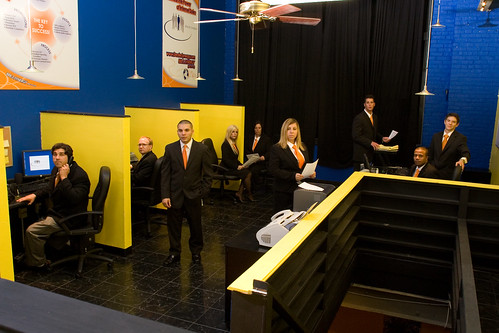By Tess Alps: Why is TV-dissing such a big part of internet orthodoxy? Clay Shirky has been out promoting his new book, Cognitive Surplus, which states that internet activity is displacing TV among the young and that this is a good thing. There have been newspaper reviews like this and yesterday he was interviewed on Radio 4’s Today programme.
To be fair to Shirky, he doesn’t say that all TV is “bad”, but he believes that being online is better – connecting, creating, sharing. I would have to be a philistine not to recognise the many positive benefits that the internet has brought us, and I share Shirky’s idealistic hope that it will promote democracy, knowledge, peace, love etc.
My problems with his book are three-fold: I dispute some of his facts, some of the distinctions that he draws and some of the science that he employs.
Facts first: is TV viewing declininTo be fair to Shirky, he doesn’t say that all TV is “bad”, but he believes that being online is better – connecting, creating, sharing. I would have to be a philistine not to recognise the many positive benefits that the internet has brought us, and I share Shirky’s idealistic hope that it will promote democracy, knowledge, peace, love etc.
My problems with his book are three-fold: I dispute some of his facts, some of the distinctions that he draws and some of the science that he employs.g for the first time ever among the young? Not in the UK or Europe, and TV catch-up services online are extra. TV viewing is booming in developing markets. Anyone who has watched the World Cup coverage will have been moved to see young African children joyfully watching their first TV football match.
Secondly, to position the internet as an alternative to TV is meaningless – and I don’t say that lightly, because Clay Shirky is clearly a very intelligent person. The internet is a vast and transformational technology, but it is not a homogenous medium.
Many human activities that once took place offline can now be conducted online, including watching TV. A growing percentage of young people’s time online is spent watching TV and video – and then talking about it, as a quick glance at Twitter will prove. Sadly, there is about a 1:99 ratio between people who create things online and those who just consume them, much as in the real world; and TV inspires online creativity.
Finally, a bit of science. The word “passive” is often used to denigrate TV viewing. There might be less physical movement than twitching with a mouse but the brain is deeply engaged watching TV. The brain is a complex organism; the very title of Shirky’s book indicates he overvalues rational and cognitive processes over emotional intelligence and education; action over feelings.
We have just finished some neuroscientific research looking at the difference in the brain activity between watching TV and browsing websites (largely text based) and the differences are marked. TV is much stronger in areas such as emotion and long-term memory encoding and web browsing is stronger for visual attention. So they are different – but complementary.
Watching TV is a mostly shared experience; the real-life conversations within families that TV provokes are enormously valuable. Entertaining people and promoting happiness is a noble pursuit; TV is the master. But we should also recognise TV’s vast role as an informer, educator and promoter of democracy every bit as important as the internet.
Most of the time, the ease that the internet brings to human endeavour is brilliant, but I can think of areas where it has casualised and arguably cheapened some things. What’s the exchange rate between an online click on a petition and a Jarrow marcher? Birthday wishes on Facebook take a mere two seconds.
I could reverse what Shirky does and make unfair comparisons between the best of TV and the worst of the internet: is it better to watch Survival and Dispatches or to play to World of Warcraft and poke a friend? But I’d rather value both these massive cultural treasures for all the good they can do, separately and together.
Tess Alps is chief executive of Thinkbox, the marketing body for UK commercial TV
That lame Hotmail tagline is why I convinced my now wife to get a Gmail account a couple years ago. I told her "whenever you send someone an e-mail, you're advertising for Hotmail." She was starting to sell custom clothing on-line, to which I added "do you really want to spam your customers with Hotmail ads every time you send an e-mail." It wasn't long before her Hotmail became a legacy inbox for spam and mailing lists and Gmail is her primary e-mail platform. It also helps that Gmail lets users send from confirmed e-mail addresses, so she doesn't even need to give out a Gmail e-mail address or send from one. It's totally transparent to the receiver.
Until Hotmail is more interested in providing a transparent service to its users such that the person they're communicating with can't distinguish which e-mail service they're using without going into e-mail headers, then it will never be "professional" to me. And any business that uses a Hotmail e-mail address (or any recognizably free e-mail address for that matter, including Gmail) loses tremendous amounts of credibility points with me. Note: not that they use a free e-mail platform, but that they can't even be bothered to spend <$10/year for a domain and set-up e-mail forwarding & send from options.
At least I don't have to put up with those stupid taglines at all anymore from Hotmail users. Does Yahoo! still put ads on all of its e-mails?
mike fuljenz mike fuljenz mike fuljenz internet marketing course

No comments:
Post a Comment